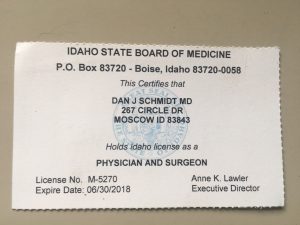Democrats are getting their hair on fire about all of Trumps executive orders. Well, I’m an Idaho Democrat so I’m concerned with Idaho’s Acting Governor’s executive orders. My hair isn’t burning, but I can see why the public isn’t paying attention. No CNN coverage, no FOX News, and no real change from the same good old boy network that’s been ignoring our state governance for the last eleven years.
Lt. Governor Little issued an Executive Order recently in Governor Otter’s absence. It was almost a sad joke. I can’t blame the audience for not laughing. Executive Order 2017-6 committed state agencies to review professional licensing boards in Idaho. In my six years in the legislature I watched many professions come to the legislature asking for licensure. Understand that such a legal power actually gives a monopoly to those licensed. You aren’t allowed to cut hair for money unless you are a licensed cosmetologist. The list of professions licensed in Idaho is long; from acupuncturists to plumbers to morticians, the legislature has chosen to protect the public by requiring professional licensure. My criteria for such requests for licensure required two questions to be answered: #1. How is the public health and safety promoted by this monopoly you request? #2. Will you be able to administer your profession? Apparently Acting Governor Little has questions. I do too.
Does this legal monopoly status really protect you? Recently a dental hygienist in Payette, Idaho was convicted in Federal Court for getting paid while misrepresenting herself as a dentist. Notice, no state prosecution, and the state Board of Dentistry only “pressured her” to give up her hygienist license a year ago. Nowhere in this indictment is the question of quality of care addressed, just whether the provider actually had the legal license to do what she was doing, and charge for it. It begs the question of whether professional licensure actually serves the public welfare or instead regulates the marketplace. What do we want from government regulation of a profession?
The legislature washes its hands of that question by turning the administration of the professions over to, guess who, the professions themselves. The only governance over all these 50+ state-granted professional monopolies is given to the executive branch: the governor. That elected official appoints the board members who then regulate themselves. Or are supposed to. Only through that office can we the voters have a voice if a profession abuses its monopoly.
Our elected governor is supposed to appoint people to each professional board with the public welfare in mind. If the appointees are only interested in protecting their own piece of the pie, the governor should see that and act. He hasn’t been doing his job. And that is the joke Brad Little offered to a disinterested electorate May 19th. “Hey, no one’s minding the store! I’ll ask some bureaucrats to make your change!”
Here’s an example: In 2005 the Idaho legislature enacted licensing of naturopathic physicians. Governor Otter appointed a five member board. The board met and issued 11 licenses, then never functioned again, to govern themselves, to repeal or issue more licenses, but in fact sued each other and been sued, proving its inability to self-govern. And the executive branch didn’t do squat. The legislature finally repealed the statute in 2015. How many other licensed professions out there are not functioning? The legislature can’t make the governor do his job. But the voters can.
Full disclosure, I answer to one of these professional boards. I am a licensed physician. I pay my annual fee to the Board, and they decide if I should get a license. I pay attention to their actions and applaud their efforts. I wish we could do more to improve the performance of our profession.
It’s just an issue of who’s in charge. And the joke is: it’s us, the professional licensees and the voting public. We ought to wake up. It’s only fair to expect our elected executives to do their job.

